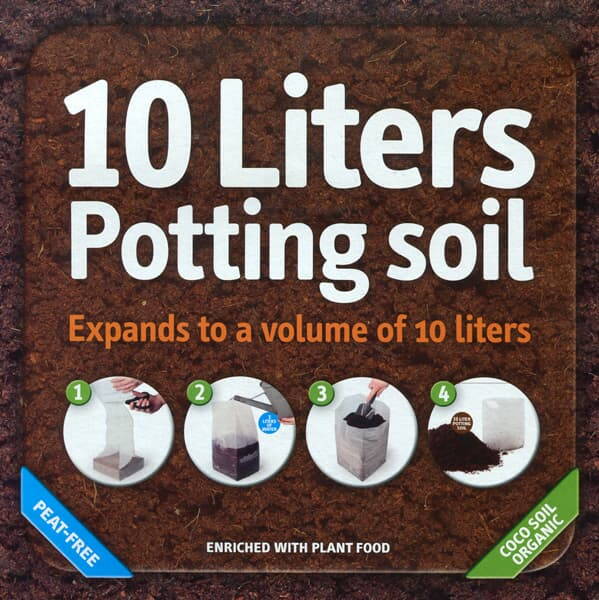Peat-free: a natural and enviromental friendly natural product.
Professional and very effective utility.
All-purpose expandable potting compost for in and outdoor use. Organic and enriched with nutrients to boost plant development and health Small lightweight, easy-to-carry pack – expands into 10 litres when water is added.
No more carrying around heavy, backbreaking bags of compost. No more mess in the car or through the house. Perfect for smaller households or flats with limited storage space. Such soil perfectly absorbs and holds moisture, and also allows the roots to breathe freely.
The substrate consists of finely ground coconut fibres, which can be mixed in equal proportions with garden soil or used to mulch the root system of plants.
How to use: place the briquette in a planting container and pour 5 litres of warm water, wait for swelling for about 15 minutes, and then add the required amount of water until the desired consistency is obtained.
Stir before use.
* COCO SUBSTRATE is a product of the coconut industry, which is the crushed remains of the coconut peel. The presence of a large number of nutrients in the substrate is due to the fact that during the formation and growth of the coconut, a large number of nutrients pass through its fibres, which later remain in them. Coconut flakes have significantly better water absorption and retention properties than peat or other substrates.
Vegetable crops (tomatoes, cucumbers, peppers, eggplant, etc.) are usually grown on a coconut substrate. Seasonally flowering potted plants, cut crops (carnation, rose, gerbera, chrysanthemum, bulbous distillation, decorative leafy, ornamental woody and tub plants) are grown from flower crops. crops From berry crops, the cultivation of strawberries is common.
Coconut substrate, used once, can also be used for repeated crop rotations and for other plants, that is, it does not require disposal (like mineral wool, for example).
Coconut substrate has a good phytosanitary condition. Studies have shown that, on average, 100 samples of microflora in a coconut substrate contain 78% Penicillium, 10% Mucor, 8% Stysanus, 4% Aspergillis. Practically, the coco substrate does not contain pathogenic fungi.
Its main advantages are:
1. Organic and environmentally friendly material.
2. The pH of the substrate is optimal for the growth of most plants (ph 5.4 - 6.8).
3. Balance of all nutritional elements.
4. Excellent ability to mix with the ground.
5. Significant water holding capacity (holds moisture 7 times its weight).
Coco coir absorbs water immediately and retains moisture much longer than peat.
Stays wet even after the ground itself has dried.
6. A structurally stable material that does not tend to break down in very humid environments.
7. Provides rapid seed germination and accelerated plant growth.
8. Enables plants to create a more developed root system.
9. Long period of use (up to 5 years).
10. 100% absence of pathogenic fungi.
11. Does not promote the growth of bacteria and fungi.
11. Has no smell.
12. An excellent mulching material, and, moreover, when wet, it has a pleasant dark colour and a brighter texture than peat.
13. Self-decomposing material.
14. When compressed, it does not compress.
15. No pests.
* Coconut fibre is produced by processing the skins of coconut palm nuts. It contains about 30% short fibres and 70% coconut dust. Long fibres are used to make mattresses, carpets, ropes, etc. Due to the high content of lignin in the soil, this unique structure is almost indestructible. In addition, coconut fiber, unlike peat, does not “settle”, and its structure is not subject to change during mechanical processing (for example, during mixing).
Has the possibility of long-term and repeated use.















